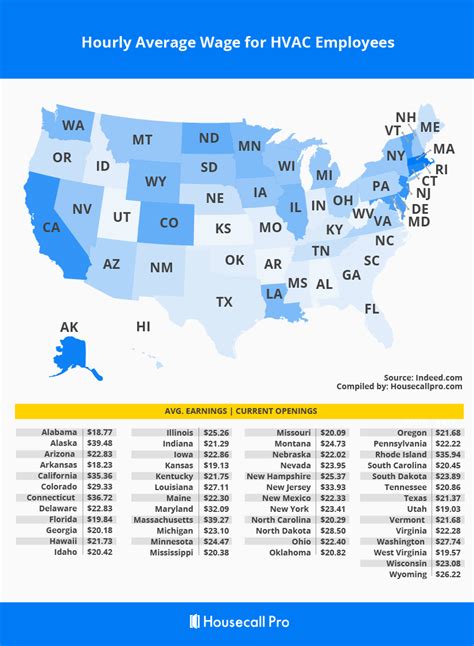The heating, ventilation, and air conditioning (HVAC) industry is a vital part of modern society, providing comfort and indoor air quality to homes and businesses across the United States. As the industry continues to grow and evolve, it's essential to understand the demographics of the workforce that keeps it running. One key aspect of this is the average age of HVAC technicians in the US today.
The Importance of Understanding the Age of HVAC Technicians
Knowing the average age of HVAC technicians is crucial for several reasons. Firstly, it helps to identify potential gaps in the workforce that may arise as older technicians retire. Secondly, it informs strategies for recruiting and training new technicians to meet the industry's future needs. Finally, it highlights the importance of promoting careers in the trades to younger generations.
Current Demographics of HVAC Technicians
According to data from the Bureau of Labor Statistics (BLS), the median age of HVAC technicians in the US is around 43-44 years old. This is slightly higher than the median age of all occupations, which is around 42 years old. The BLS also reports that the age distribution of HVAC technicians is as follows:
- 25-34 years old: 24.1%
- 35-44 years old: 31.4%
- 45-54 years old: 26.5%
- 55-64 years old: 14.5%
- 65 years and older: 3.5%
Factors Contributing to the Aging Workforce
Several factors contribute to the aging workforce in the HVAC industry. These include:
- Aging population: The US population is aging, and this trend is reflected in the HVAC workforce. As the baby boomer generation retires, the industry is facing a shortage of skilled technicians.
- Lack of young entrants: The HVAC industry has historically struggled to attract young people, leading to a shortage of new entrants to replace retiring technicians.
- Perceptions of the trade: Many people view working in the trades as physically demanding and lacking in prestige, which can discourage young people from pursuing a career in HVAC.
Consequences of an Aging Workforce
The aging workforce in the HVAC industry has several consequences, including:
- Skills gap: As experienced technicians retire, the industry risks losing valuable skills and knowledge.
- Recruitment challenges: Attracting new entrants to the industry can be difficult, leading to recruitment challenges and increased competition for skilled technicians.
- Increased training needs: As the workforce ages, there is a growing need for training and upskilling programs to ensure that technicians have the necessary skills to work with new technologies.
Solutions to Address the Aging Workforce
To address the aging workforce in the HVAC industry, several solutions can be implemented, including:
- Apprenticeships and training programs: Developing apprenticeships and training programs can help attract new entrants to the industry and provide them with the necessary skills and knowledge.
- Promoting careers in the trades: Promoting careers in the trades through social media, schools, and community outreach programs can help to raise awareness of the opportunities available in the HVAC industry.
- Recruitment strategies: Implementing targeted recruitment strategies, such as offering competitive salaries and benefits, can help to attract new entrants to the industry.
Industry Initiatives to Address the Workforce Gap
Several industry initiatives are underway to address the workforce gap in the HVAC industry. These include:
- The HVACR Workforce Development Foundation: This foundation provides scholarships and training programs to support the development of the HVAC workforce.
- The Air-Conditioning, Heating, Refrigeration Certification Board (ACHR): ACHR provides certification programs for HVAC technicians, which can help to raise the profile of the industry and attract new entrants.
- The Plumbing-Heating-Cooling Contractors Association (PHCC): PHCC offers training programs and apprenticeships to support the development of the HVAC workforce.
Conclusion
The average age of HVAC technicians in the US today is around 43-44 years old, which is slightly higher than the median age of all occupations. The aging workforce in the HVAC industry poses several challenges, including a skills gap, recruitment challenges, and increased training needs. However, by implementing solutions such as apprenticeships, promoting careers in the trades, and targeted recruitment strategies, the industry can work to address these challenges and ensure a skilled and sustainable workforce for the future.
Gallery of HVAC Technicians at Work





FAQs
What is the average age of HVAC technicians in the US?
+The average age of HVAC technicians in the US is around 43-44 years old.
What are the consequences of an aging workforce in the HVAC industry?
+The consequences of an aging workforce in the HVAC industry include a skills gap, recruitment challenges, and increased training needs.
What initiatives are underway to address the workforce gap in the HVAC industry?
+Several industry initiatives are underway, including apprenticeships, training programs, and certification programs.
